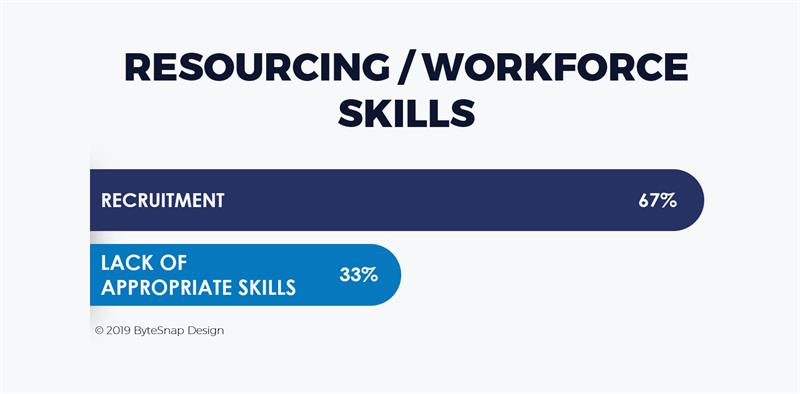While exhibiting and presenting at the Engineering Design Show (EDS) last month, the ByteSnap team interviewed show visitors and asked what they felt their greatest challenges were.
Executives from electronics companies were questioned and the ByteSnap team gained valuable and specific insights into the constraints facing the industry today and into the next decade.
Survey snapshot
- 20% of respondents said their biggest challenge is political uncertainty, especially Brexit
- 20% felt that finding new business was a key concern
- 18% said that finding the right talent and skillsets was a challenge for their organisation
- 18% cited meeting project lead times as critical
- 17% were concerned about obsolete technology
Brexit is affecting key decisions
Brexit was the biggest challenge cited by 20% respondents. The UK’s potential exit from the European Union has a trove of implications for electronic design companies. Brexit may or may not happen. Several respondents were concerned about how UK and European companies would continue to do business in the event of the UK leaving the EU.
There is ambiguity around tariffs and taxes, employment of European workers, grants and exemptions, and licensing and regulations, including the Radio Equipment Directive.
The offshoot of this uncertainty is that many businesses in the UK and Europe and operating a “wait and see” approach. They are unwilling to commit to new projects and award new contracts that may be impacted by Brexit. In the worst cases, component buyers are looking away from the UK and even Europe, to avoid having to change agreements in a post-Brexit future.
Finding new business is a major concern
20% of electronics professionals stated that finding new business and retaining existing clients is even more challenging than normal.
Electronics companies who said finding new business was a challenge were divided on the more specific reasons. Several were concerned about finding enough opportunities to increase revenue and achieve growth. Others were worried about moving into new verticals, filtering real opportunities, and offering products and services to tie into new trends and technologies, such as AI (Artificial Intelligence), IoT (Internet of Things) and EV (Electric Vehicles).
Recruiting and retaining the right team is vital
18% of respondents found employing the right people was a major challenge. By far the greatest concern out of human resource challenges for the electronics sector appears to be recruiting new hires. A lack of appropriate skills and an understanding of embedded technology are also issues for industry peers.

Delivering electronics projects on time and on budget
18% of respondents cited pressure from clients to deliver projects quickly, identifying lead times as a concern. The electronics industry is growing, competition is fierce, and the sales effort requires commitment to delivering contracts and projects on time.
In terms of budget worries, respondents also recognised that in Europe the electronics industry also faces competition from China and Eastern Europe where labour costs and sometimes components are cheaper, and companies can promise lower prices.
Obsolete technology
17% of electronics professionals were concerned about technology developments, including component obsolescence as it can render an entire product very difficult to sell and leave a business with hefty research and development, design and marketing costs, and even manufacturing investment costs, with no avenue for return on investment.
It's not just component obsolescence that brings technology challenges, respondents also cited:
- the need to keep on top of programming developments
- emerging technologies like AI, which disrupt industries as well as providing new opportunities
- having the technical knowledge to design smaller and smaller products.
Dunstan Power, Director of ByteSnap concluded: “Brexit will impact the electronics industry, skill shortages will persist, component and major operating systems (Windows) obsolescence will continue to provide challenges, but the sales effort must go on.
“Our snapshot of industry challenges taken from EDS can help all industry participants understand current threats and constraints and create a strategy to overcome these problems.“













